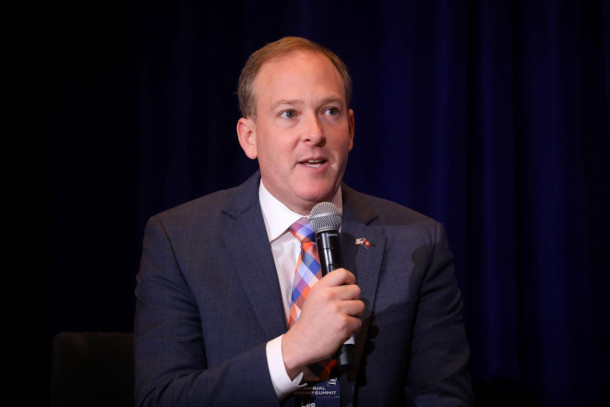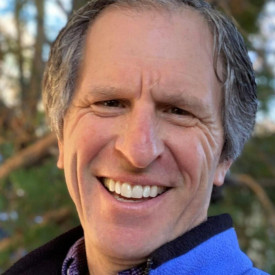Eco-Rollbacks From Trump
Air Date: Week of April 11, 2025

Cash disagrees with the new EPA administrator, Lee Zeldin, who claims that the Greenhouse Gas Reduction Fund program is wasteful. (Photo:: Gage Skidmore, Wikimedia Commons, CC BY-SA 2.0)
The Trump administration has paused funding from the Greenhouse Gas Reduction Fund, impacting multiple projects that were already approved and in progress. The Environmental Protection Agency also set up a new email address for companies to fast track requests for exemptions of pollution rules under the Clean Air Act. Former New England EPA administrator David Cash joined Host Aynsley O’Neill to discuss.
Transcript
O’NEILL: The Trump Administration has been making moves to slash funding and personnel at the Environmental Protection Agency. One such program affected accounts for $20 billion in Greenhouse Gas Reduction Fund grants, pausing several Green Bank projects that were already under contract for the money. And recently the EPA has promoted the opportunity to seek exemptions from the Clean Air Act, which is music to the ears of fossil fuel and chemical companies alike. David Cash is the former US Environmental Protection Agency New England Administrator, and he joins us now to talk about recent actions by the EPA. David, welcome back to Living on Earth!
CASH: Thanks. It's great to be here.
O'NEILL: So, David, one of the latest pieces of news I've heard out of the EPA is about an email address they've set up where companies can request a special exemption from certain requirements under the Clean Air Act. What's going on there? What's this new system all about?
CASH: Yeah, this is just another in the growing list of assaults on our clean air and clean water and assaults that will cause more asthma, more heart attacks, more cancer, more birth defects. Essentially, it's saying this is a Get Out of jail free card in what's otherwise a very robust regulatory program that makes sure that industry doesn't pollute in a way that hurts our health. And basically, it's setting up an easy way for a company or now, what we've seen this past week, an entire industry, the chemical industry, has submitted an email asking for relief from these kinds of regulations that will just put more toxic air pollutants in our air that we breathe. Unprecedented. This has never been done like this before.
O'NEILL: And you mentioned that people have already started applying for these waivers. What is the sort of status of that? And how soon do you think we'll be seeing the impacts from it?
CASH: Yeah so, we know that one large power plant, a coal burning power plant, has already submitted a waiver. That happened shortly after the announcement was made, and just in the last couple of days, basically the entire chemical industry has also submitted such a waiver. The American Chemistry Council and the American fuel and petrochemical manufacturers associations have submitted this waiver to do a broad brush waiver from all of these emission standards that took years and years, huge amount of scientific effort, public input, input from industry themselves, to assure that the technologies that were required in these regulations are available, are economical, And that, of course, there's no impact on national security. Those are the two hooks in the Clean Air Act that this EPA is using, saying, if the technology is not available or it might impact national security, neither of which, neither of which there's any evidence of. We've seen this now time and again with administrator Zeldin is making these kinds of claims that have no basis in the evidence at all.
O'NEILL: Well, speaking of claims from EPA Administrator Zeldin, there's this greenhouse gas reduction fund that has been the subject of many such claims. Now you are on the steering committee of that greenhouse gas reduction fund. Can you explain what that was and what the status of that money is now?

David Cash is the former Administrator of EPA's New England Region under Region 1. (Photo: Courtesy of David Cash)
CASH: Yeah. So, the Greenhouse Gas Reduction Fund was created by Congress by statute, legally in the Inflation Reduction Act, and it was a really innovative. And exciting part of the act, because what it did was, instead of just giving out grants, for example, it was creating green banks, $20 billion that would go to eight lending institutions and networks of these lending institutions that have a very robust history of lending money to businesses and communities and cities and towns. And the whole idea was to unleash investments for energy efficiency, renewable energy, electric vehicles, all these things that would bring down energy costs, increase our energy independence, grow jobs and spark innovation and entrepreneurship. And what was really amazing about this is that the analysis was that for each federal dollar that was invested, $7 would come off the sidelines from the private sector. So, for that $20 billion about $150 billion the private sector would step in to make investments and administrator Zeldin raised these completely phony accusations of waste, fraud and abuse, so the funding has been frozen.
O'NEILL: What communities are going to be impacted if the money from that Green Bank never makes its way to the programs it was promised to?
CASH: So, there are a number of specific communities that already had applied and did the very rigorous application process to get the actual grants from the green banks, and basically, this is going to impact communities all over the country who are depending on this kind of funding to for example, there's one program in Arkansas to expand solar to bring down costs for energy for communities that's on hold. There's a plan that was worked on in collaboration with Oregon and New York to build public housing, very energy efficient public housing that would lower energy costs for those who live in the houses, which again, supposedly we're in the middle of a housing emergency, and we're in the middle supposedly of an energy emergency. This would have solved both of those problems for these communities. There's funding that was going to truckers that want to electrify so they can lower their costs for trucking and create cleaner air for the kids in the communities that they drive through. That's on hold. So, all of this based on no evidence at all, is freezing funding that would have lowered asthma rates for kids, that would create great jobs, that would create greater energy independence. So, we're seeing missed opportunities in communities all over the country, rural, urban, everywhere.
O'NEILL: And David, I understand that there are lawsuits pushing back against this.
CASH: Yes, the Green Banks, that had competed for and qualified for this funding and is now frozen by the EPA, has brought suit against the EPA in the US District Court in District of Columbia in DC, and in fact, most recently, a judge who's been looking at this basically said that EPA quote “proffered no evidence to support their basis for the sudden terminations.” So that's where things stand right now. But let me kind of take a step back. We've talked about these waivers, and we've talked about the Greenhouse Gas Reduction Fund, and we could look across the actions of this administration, not just in environment, but in health and human services, and national security, that the actions that are being taken is an example of which in the Greenhouse Gas Reduction Fund are unlawful, extra lawful abuses of executive power that step well beyond general differences in policy, but go toward a constitutional crisis. We're in that right now. We are in a constitutional crisis right now where the rule of law is being questioned in a fundamental way. And I happen to be in the environment field, and I'm seeing it here, but I talk with colleagues in many other sectors, and we're seeing this all over.
O'NEILL: David Cash is the former US Environmental Protection Agency, Administrator for New England. Thank you for joining us, David, and we will talk to you soon.
CASH: Sounds great. Thanks so much.
O’NEILL: We reached out to the Environmental Protection Agency, who pointed us to a section in the Clean Air Act which states that the President may provide exemptions when he determines that, quote, “the technology to implement such standard is not available and that it is in the national security interests of the United States to do so.” They also confirmed the window for Clean Air Act exemption requests closed on March 31st, 2025.
Links
Read more about the Clean Air Act exemption application
Learn more about David Cash’s resignation from the EPA
Learn more about the lawsuit against the EPA from one of the plaintiffs, Climate United
Living on Earth wants to hear from you!
Living on Earth
62 Calef Highway, Suite 212
Lee, NH 03861
Telephone: 617-287-4121
E-mail: comments@loe.org
Newsletter [Click here]
Donate to Living on Earth!
Living on Earth is an independent media program and relies entirely on contributions from listeners and institutions supporting public service. Please donate now to preserve an independent environmental voice.
NewsletterLiving on Earth offers a weekly delivery of the show's rundown to your mailbox. Sign up for our newsletter today!
 Sailors For The Sea: Be the change you want to sea.
Sailors For The Sea: Be the change you want to sea.
 The Grantham Foundation for the Protection of the Environment: Committed to protecting and improving the health of the global environment.
The Grantham Foundation for the Protection of the Environment: Committed to protecting and improving the health of the global environment.
 Contribute to Living on Earth and receive, as our gift to you, an archival print of one of Mark Seth Lender's extraordinary wildlife photographs. Follow the link to see Mark's current collection of photographs.
Contribute to Living on Earth and receive, as our gift to you, an archival print of one of Mark Seth Lender's extraordinary wildlife photographs. Follow the link to see Mark's current collection of photographs.
 Buy a signed copy of Mark Seth Lender's book Smeagull the Seagull & support Living on Earth
Buy a signed copy of Mark Seth Lender's book Smeagull the Seagull & support Living on Earth

